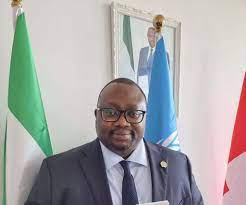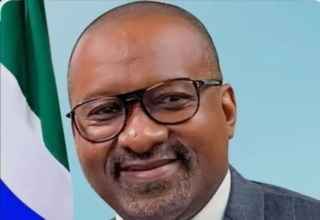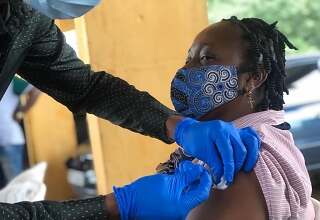
B𝐲 𝐋𝐚𝐧𝐬𝐚𝐧𝐚 𝐆𝐛𝐞𝐫𝐢𝐞
𝑇ℎ𝑒 𝐺𝑙𝑜𝑏𝑎𝑙 𝑇𝑖𝑚𝑒𝑠 𝑎𝑠𝑘𝑒𝑑 𝐴𝑚𝑏𝑎𝑠𝑠𝑎𝑑𝑜𝑟 𝐷𝑟. 𝐿𝑎𝑛𝑠𝑎𝑛𝑎 𝐺𝑏𝑒𝑟𝑖𝑒, 𝑆𝑖𝑒𝑟𝑟𝑎 𝐿𝑒𝑜𝑛𝑒’𝑠 𝑃𝑒𝑟𝑚𝑎𝑛𝑒𝑛𝑡 𝑅𝑒𝑝𝑟𝑒𝑠𝑒𝑛𝑡𝑎𝑡𝑖𝑣𝑒 𝑡𝑜 𝑡ℎ𝑒 𝑈𝑛𝑖𝑡𝑒𝑑 𝑁𝑎𝑡𝑖𝑜𝑛𝑠 𝑎𝑛𝑑 𝑜𝑡ℎ𝑒𝑟 𝐼𝑛𝑡𝑒𝑟𝑛𝑎𝑡𝑖𝑜𝑛𝑎𝑙 𝑂𝑟𝑔𝑎𝑛𝑖𝑠𝑎𝑡𝑖𝑜𝑛𝑠 𝑖𝑛 𝐺𝑒𝑛𝑒𝑣𝑎, 𝑡ℎ𝑒 𝑔𝑙𝑜𝑏𝑎𝑙 𝑐𝑒𝑛𝑡𝑟𝑒 ℎ𝑢𝑚𝑎𝑛 𝑟𝑖𝑔ℎ𝑡𝑠 𝑖𝑛𝑖𝑡𝑖𝑎𝑡𝑖𝑣𝑒𝑠, 𝑡𝑜 𝑟𝑒𝑓𝑙𝑒𝑐𝑡 𝑜𝑛 𝑡ℎ𝑒 𝑡𝑒𝑛𝑠𝑖𝑜𝑛𝑠 𝑏𝑒𝑡𝑤𝑒𝑒𝑛 𝑡ℎ𝑒 𝑖𝑚𝑝𝑒𝑟𝑎𝑡𝑖𝑣𝑒𝑠 𝑜𝑓 𝑠𝑡𝑎𝑡𝑒 𝑠𝑒𝑐𝑢𝑟𝑖𝑡𝑦 𝑎𝑛𝑑 𝑜𝑢𝑟 𝑐𝑜𝑚𝑚𝑖𝑡𝑚𝑒𝑛𝑡 𝑡𝑜 𝑓𝑢𝑛𝑑𝑎𝑚𝑒𝑛𝑡𝑎𝑙 ℎ𝑢𝑚𝑎𝑛 𝑟𝑖𝑔ℎ𝑡𝑠.
Nothing that President Bio has done since taking office in 2018 has been more confounding to critics and supporters alike than his principled and scrupulous fidelity to human rights as a primary commitment of his administration. Shortly after taking office, the president moved with disarming single mindedness to vastly expand the democratic space and deepen good governance, notably by repealing the seditious libel law, the death penalty, and the ban on pregnant girls attending school. None of these landmark decisions were popularly demanded: indeed, all faced, and still face, strong bi- or multi-partisan opposition.
I attended the parliamentary debate on the bill to repeal the seditious libel law in early 2020: I was slightly shocked, but not entirely surprised, that APC opposition MPs raised more stringent objections to the bill than SLPP MPs. Nor was there public support for it: advocacy around its repeal was confined to media practitioners. Much the same can be said about the abolition of the death penalty: there was no popular demand for it (though the Truth and Reconciliation Commission recommended it in 2004), and there was much opposition – in cabinet, parliament, law enforcement agencies and even among a section of civil society – to it. After the recent disastrous attempted coup – which was heralded by the criminal release of hundreds of people, including convicted murderers and treason suspects, from gaol – this opposition has grown louder. On the decision to lift the ban on pregnant girls attending school – a banned enforced by the previous APC government with bewildering pedantic zeal – I recommend Chief Minister David Sengeh’s book, Radical inclusion, to readers. There was no support in cabinet, not to mention parliament, for this idea even after his persistently canvassing it; and civil society was staunchly opposed. The President made the decisive wager: “once President Bio – the person who ultimately had the most leverage to drive change from within the system – was engaged, the change came about much quicker than anticipated,” Dr. Sengeh writes.
In the global world of human rights, these achievements are recognised – and are then used as the basis to demand more: new guarantees, intrusive inquiries, pressure to experiment with inventive forms of rights, and sometimes blatant false allegations emanating from opposition sources. Since Geneva is global nerve centre of human rights, I often have to respond to such pressures, sometimes by pointing out the obvious: no journalist, politician, or human rights defender has been imprisoned in Sierra Leone for expressing their political or other views since President Bio took office; and no state execution has happened there since 1998.
Still, a persistent talking point of the opposition – and the one that most inflames the educated public and international observers – is the charge that we have been guilty of human rights violations, including extrajudicial killings by the state security agencies. This inflammatory charge is obviously grossly unfair. Allegations of such abuses have focused on a handful of dramatic incidents, all of them triggered by violent anti-state actions or attempted coup. They include violent disturbances at Pademba Road Prisons in Freetown, in Makeni, Lunsar, and Tombo; and most dramatically, the violent insurrection of 10 August 2022. These incidents were referred to in reports by the US State Department and Amnesty International, both appearing in March 2023, almost as if coordinated. Though both reports highlighted significant expansion of the democratic space and important measures taken by the government to advance human rights, opposition attacks focused on the negative events to paint the government and its agents as compulsive human rights abusers.
In fact, this year, the UN Office of High Commissioner for Human Rights in Geneva, the world’s most credible and important human rights monitor, reassessed the Human Rights Commission of Sierra Leone (HRCSL) and gave it a Grade A status, reflecting the improved human rights atmosphere in Sierra Leone. Attorney General and Minister of Justice, Mr. Mohamed Lamin Tarawalley, reinforced this message of commitment at the Human Rights Council in Geneva in March this year. Among other things, he highlighted President Bio’s achievements around access to justice for survivors of sexual violence, including the creation of the Sexual Offences Model Court in 2020 and his enactment of the Gender Equality and Women’s Empowerment Bill. “Another significant human rights milestone is the signing of all nine fundamental human rights treaties and submitting initial and periodic reports on five of them. This underscores our commitment to enhancing our human rights record. Our ongoing engagement with international human rights mechanisms reflects the government’s dedication to this cause. We will persist in collaborating and actively participating in the activities of regional and sub-regional human rights treaty bodies, ” he said.
Those who made the catastrophic attempt to unseat the government on 26 November would have reversed all these gains and indeed plunged our country into a very very dark and bloody mess. Their terrible actions must not keep us off track; but justice must be served wherever the evidence leads. This will not be a negation of human rights, but their positive affirmation. Violent attacks against the state and its agents are truly grave offences. So, we must not shy away from stating a fundamental point: that it is a primary obligation of the government to act decisively to prevent public disorder; still more when the forces of that disorder aim to degrade or destroy state institutions and the governing principles of our democratic order – which is that our government can only be changed through the ballot box.














